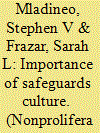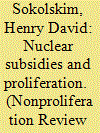|
|
|
Sort Order |
|
|
|
Items / Page
|
|
|
|
|
|
|
| Srl | Item |
| 1 |
ID:
153896


|
|
|
|
|
| Summary/Abstract |
Brazil, a developing country with an advanced nuclear program, presents an interesting case for observers of nuclear politics. Brazil is one of a handful of countries that possess uranium-enrichment technology, one of three countries in Latin America that produce nuclear power, and the only country without nuclear weapons to pursue an ambitious nuclear-powered submarine program. Among external views on Brazil's nuclear politics, the perceptions of Argentina and the United States matter most. With Argentina, Brazil shares responsibility for regional security. The two countries’ commitment to a bilateral nuclear safeguards arrangement contributes to a peaceful environment in the region. The United States will continue to set the tone in global nuclear matters and thus its views of Brazil's role in the nuclear field will continue to matter to Brasília, even as Brazil's political and economic crises have thrown the country’s nuclear future into uncertain territory.
|
|
|
|
|
|
|
|
|
|
|
|
|
|
|
|
| 2 |
ID:
127129


|
|
|
|
|
| Publication |
2013.
|
| Summary/Abstract |
International safeguards is the system of measures put in place by the International Atomic Energy Agency and states to ensure nuclear programs remain dedicated to peaceful purposes. This international safeguards system consists of agreements, inspections, and evaluations that have never considered the safeguards culture of a state or facility. Neither a common definition nor an understanding of safeguards culture is internationally recognized. This article provides an analysis of the concept of safeguards culture and gauges its value to the international safeguards community. The authors explore distinctions among safeguards culture, safeguards compliance, and safeguards performance, and suggest possible indicators of safeguards culture and methods to promote a strong, positive safeguards culture.
|
|
|
|
|
|
|
|
|
|
|
|
|
|
|
|
| 3 |
ID:
144294


|
|
|
|
|
| Summary/Abstract |
In March 2015, the South Australian state government established a royal commission to investigate the financial, social, technical, diplomatic, and nonproliferation benefits and risks of expanding its nuclear industry, including activities related to uranium mining; enriching, reprocessing, and fabricating nuclear fuels for both domestic use and export; producing nuclear power; and storing radiological waste, including foreign spent reactor fuel. Given its enormous uranium reserves and current mining activities, some Australians have argued that Australia could benefit financially by expanding the mining sector and by adding value to its uranium exports by enriching the material and fabricating it into reactor fuel assemblies. Others have maintained that Australia can realize significant economic benefits by recycling and storing foreign spent fuel and producing carbon-free nuclear power. In the end, the commission recommended that Australia consider opening up a high-level waste repository to take in foreign spent fuel. It did not recommend any other nuclear activities at this time. The following viewpoint is based on testimony I delivered to the commission on the nuclear weapon proliferation implications of the proposed activities. If Australia wants to avoid the temptation of selling nuclear goods to states that might use these goods to make bombs, it should only consider new nuclear activities that can be entirely financed by the private sector and turn a profit without having to resort to foreign sales. This policy would also enable Australia to set an important, new international nonproliferation standard.
|
|
|
|
|
|
|
|
|
|
|
|
|
|
|
|
| 4 |
ID:
106909


|
|
|
|
|
| Publication |
2011.
|
| Summary/Abstract |
Preventing the weaponization of outer space is one of the most relevant issues of the current space law debate. In recent years discussions on this issue have significantly increased in international fora, such as the UN Conference on Disarmament and the COPUOS. While it has not been possible to arrive at an agreed solution on how to efficiently deal with the problem of possible weaponization of outer space so far, several valuable proposals have been put forward. China and Russia, on the one side, and the European Union, on the other, have taken the lead in this respect. While the former have submitted a proposal for a draft treaty on the demilitarization of outer space, known as the PPWT, the latter has issued a Draft Code of Conduct for Outer Space Activities. Despite the differences between the two proposals, this paper proposes the development of a Chinese, Russian and European common approach aimed at preventing the weaponization of outer space. Although such a goal is undoubtedly challenging, some political and legal factors may enable such cooperation in the not-too-distant future.
|
|
|
|
|
|
|
|
|
|
|
|
|
|
|
|
|
|
|
|
|